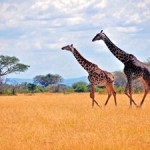Delinking the relationship between ecological footprint and development is a key global priority indicated in the report. While per capita Ecological Footprint of high-income countries is five times that of low-income countries, research demonstrates that it is possible to increase living standards while restraining resource use.
The 10 countries with the largest per capita Ecological Footprints are: Kuwait, Qatar, United Arab Emirates, Denmark, Belgium, Trinidad and Tobago, Singapore, United States of America, Bahrain and Sweden.
The Climate Connection

The report comes months after a United Nations study warned of the growing impacts of climate change and gives evidence to the finding that climate is already impacting the health of the planet.
According to the Living Planet Report 2014, more than 200 river basins, home to over 2.5 billion people, experience severe water scarcity for at least one month every year. With close to one billion people already suffering from hunger, the report shows how climate, combined with changing land uses, threatens biodiversity and could lead to further food shortages.
Constructive negotiations over an international climate deal are among the opportunities that exist to control these trends. Completion of a global agreement that clears the way to a low carbon economy is essential given that fossil fuel use is currently the dominant factor in Ecological Footprint.
A complementary set of negotiations on a set of development goals creates the opportunity for countries to address how natural systems can be protected as world population surpasses 9.5 billion in coming decades.
Sustainable Solutions
The Living Planet Report 2014 serves as a platform for global dialogue, decision-making and action for governments, businesses and civil society at a critical time for the planet.
The report provides WWF’s “One Planet Perspective” with strategies to preserve, produce and consume more wisely. It also includes examples of how communities are already making better choices to reduce ecological footprint and biodiversity loss.
“Nature is both a lifeline for survival and a springboard to prosperity. Importantly, we are all in this together. We all need food, freshwater and clean air – wherever in the world we live. At a time when so many people still live in poverty, it is essential to work together to create solutions that work for everyone,” said Lambertini.
In Asia, the report shows how cities are innovating ways to reduce carbon emissions, integrate renewable energy and promote sustainable consumption. In Africa, the report profiles how government can work with industry to protect natural areas. In other examples from around the world, the report highlights initiatives to control pollution, transform markets and improve lives.
WWF’s “One Planet Perspective” shows how every corner of the globe can contribute to maintaining an ecological footprint that doesn’t outpace Earth’s ability to renew. By following WWF’s programme for one planet living, society can begin reversing the trends indicated in the Living Planet Report 2014.
Check the following link to read/download the Full Report:
http://wwf.panda.org/about_our_earth/all_publications/living_planet_report/
Source: WWF.














